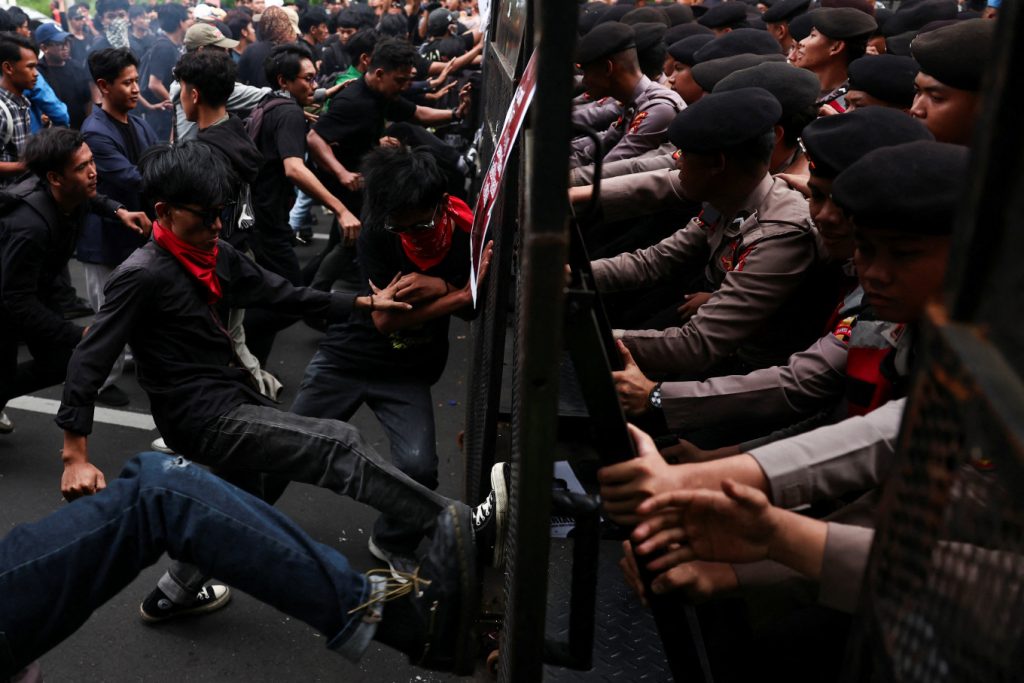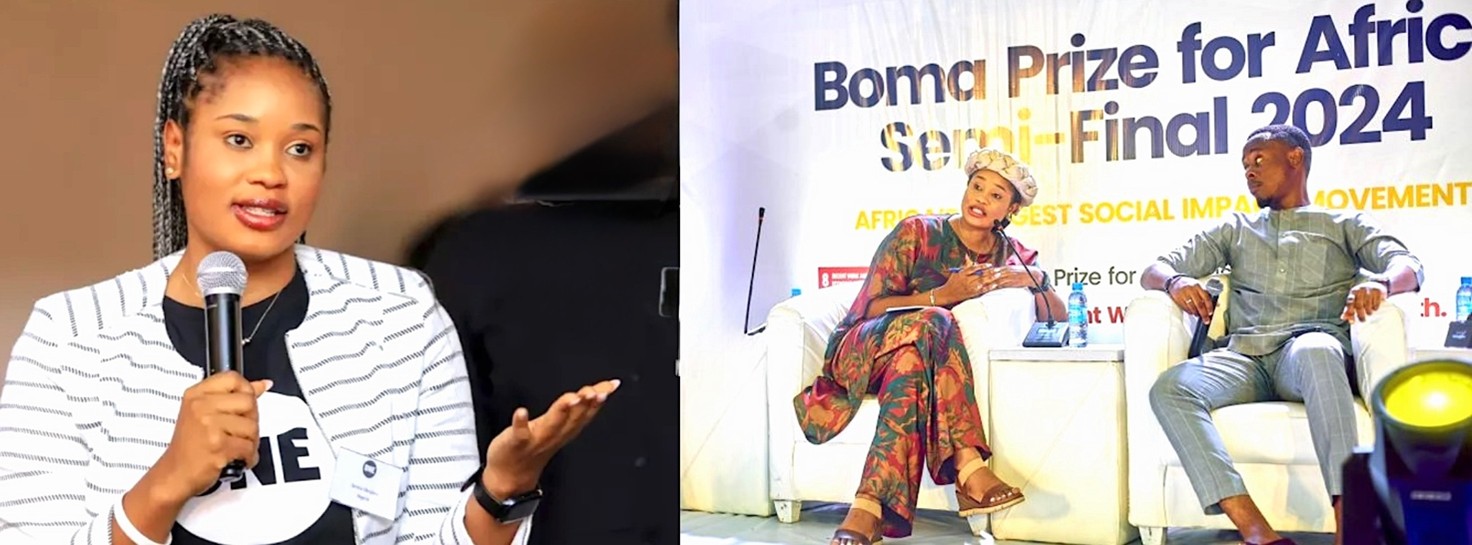Today’s youth are numerous but politically complacent; celebrated as a demographic bonus yet treated as disposable; expressive in voice but struggling to author a narrative of their own.

Demonstrators try to break the police barricade during a protest on the first anniversary of President Prabowo Subianto’s administration, criticizing government policies, including the free meals program, in Jakarta, on Oct. 20, 2025. (Reuters/Willy Kurniawan)
Ninety-seven years ago, on Oct. 28, the youth of 1928 dared to imagine Indonesia before it existed. The Sumpah Pemuda (Youth Pledge) was not merely a pledge but an act of moral audacity, to declare unity, identity and destiny against colonial subjugation. It was a vision born from indignation and imagination.
Yet, as the nation nears the centenary of that moment, the spirit of renewal that once defined the pemuda (youth) feels adrift.
Indonesia remains young in demographics but old in its power, ideas and habits. The contradictions that confront today’s youth are stark: they are numerous but politically complacent; celebrated as a demographic bonus yet treated as disposable; expressive in voice but struggling to author a narrative of their own.
If 1928 was the youth’s idea against colonialism, what idea will define them now, against inequality, precarity and complacency? In 20 years’ time, the country that the pemuda envisioned almost a century ago will mark its centenary. But will it be one that today’s youth can draw and shape?
In their ground-breaking 2025 study, Complacent Democrats, Burhanuddin Muhtadi, Eve Warburton and Liam Gammon reveal an unsettling paradox: Indonesia’s Gen-Z, who will form more than one-third of voters by 2029, express strong support for democracy but little commitment to its practice. They cherish stability and predictability over participation and reform.
This is not apathy born of ignorance but of adaptation, to a system that rewards conformity and penalizes dissent. In a political order where ideology has been replaced by branding, and civic trust by celebrity, pragmatism becomes survival.
The late-August unrest over the House of Representatives members’ lavish housing allowances and the death of an online transportation delivery driver struck by a police armored car ignited a brief wave of outrage across the country.
Yet the anger was short-lived, a momentary rupture that revealed the fragility of youthful dissent. It reflected how pragmatism as survival leaves little room for sustained outrage. The state swiftly imposed order, on the streets and online, as banality once again overshadowed principle.
Many young Indonesians see democracy not as a project to deepen but a condition to endure. This quiet detachment echoes the logic of the market: flexibility, endurance and self-reliance.
Yet a democracy without conviction soon becomes procedural, not purposeful. The question that haunts us is whether today’s youth, heirs to the republic, can still imagine democracy as something more than stability, as something worth defending and redefining.
If contradiction over democracy and complacency among Gen-Z is political, another one is economic. In my previous piece in this newspaper and in the sociologist Diatyka Yasih’s study of precarious workers, we see how Indonesia’s youth face chronic insecurity across sectors. Even university graduates enter a labor market defined by outsourcing, gig work and stagnant wages.
The World Bank’s October 2025 report warns that job creation has slowed to its weakest pace in a decade, while productivity lags behind regional peers. Youth unemployment and underemployment persist, even as higher education enrollment rises. Fiscal constraints threaten to narrow social protection just when living costs surge.
The result is an economy that treats its young citizens as flexible inputs rather than future builders. They are praised as the nation’s demographic bonus, yet denied pathways to stability or advancement. It is a quiet betrayal: a generation promised the future but priced out of it, navigating survival rather than citizenship.
Even in the socio-cultural space, the paradox deepens. As I co-wrote in The Narrative Battle, today’s youth are fluent in the language of high-level political or policy debates yet constrained in authenticity. Their activism, memes and cultural movements often recycle older vocabularies, of Reform, nationalism or moral outrage, rather than generating a genuine grammar of youth agency.
This is less a failure of imagination than of solidarity with their own peers. The youth are expected to speak, but rarely invited to mold meaning. Their voices are abundant but weightless, filtered through the algorithms of outrage or the patronage of power. The result is a generation that can speak to the world but struggles to be heard at home, by their own brethren, let alone by the powerful. If 1928 was the birth of a unifying script, today’s Indonesia faces the risk of narrative fatigue, where the young inherit stories too hollow to carry, and too old to renew.
As the nation approaches the Sumpah Pemuda centenary, today’s pemuda must prepare the new pledge. In 1928, youth pledged unity in diversity; in 2028, they must pledge solidarity in adversity.
The next Sumpah Pemuda must go beyond unity, toward fairness, inclusion and courage.
Indonesia’s youth cannot merely inherit the republic; they must remake it. After all, the young of today will lead the country in the very near future.
This means institutions that trust young people with real responsibility, not token gestures. It means economic models that reward creativity and care, not just compliance. And it means social spaces that enable the youth to write their own narratives, not mimic those handed down to them.
The youth of 1928 gave Indonesia its first collective idea, unity against colonialism. The youth of 1998 reclaimed freedom from authoritarianism. The youth of 2028 must defend the republic from indifference.
The new oath must be one of a shared future, just economy and renewed vision and narrated in authentic language. Because a republic without generational refresh is only an echo of its past, and Indonesia, a nation born from a grand vision, deserves better than to grow old and wither.*
Adi Abidin is a public policy specialist at Kiroyan Partners and a research fellow at Populi Center. The views expressed are personal.
Source: The Jakarta Post, October 29, 2025.
Download the clipping here.



